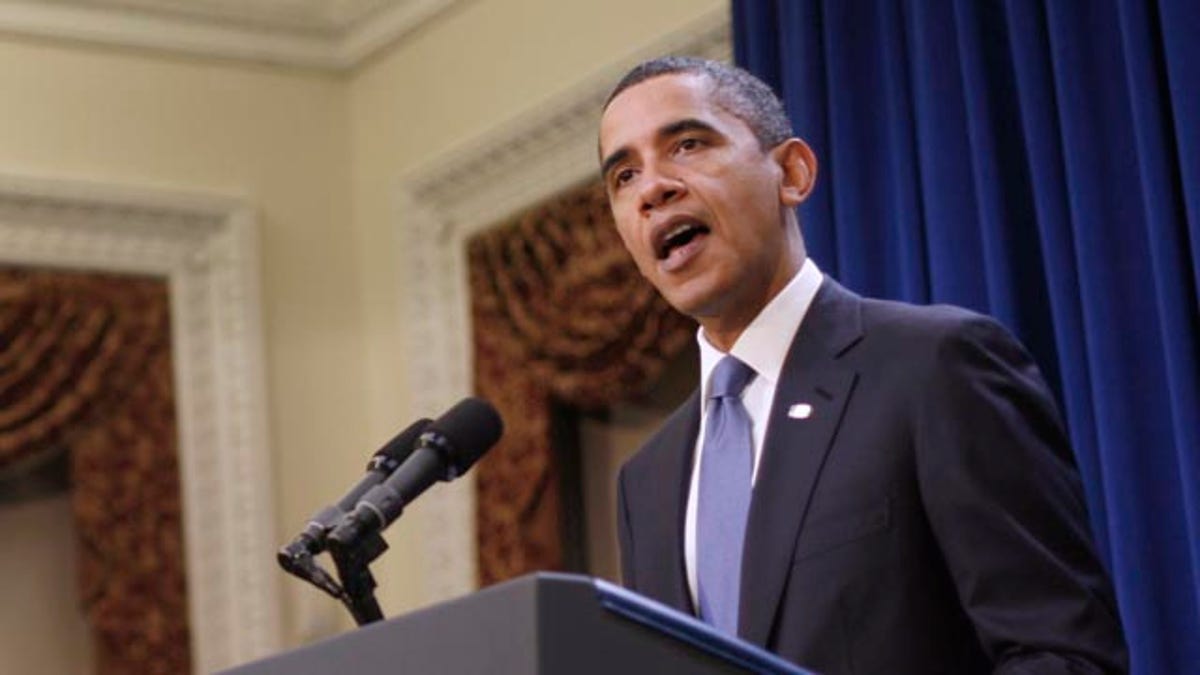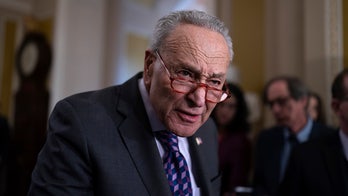
Monday: Obama delivers a statement to members of the media in the Old Executive Office Building on the White House campus. (AP)
Federal employees may seem a popular target as the Obama administration looks for budget cuts, but the president's proposed two-year pay freeze won't actually stop them from getting raises.
Though President Obama has called on Congress to halt cost-of-living adjustments for the federal civilian workforce, many employees are still expected to receive raises through the rigid ladder-climbing pay system known as "step increases."
Under the federal pay formula, employees are eligible for a regular pay raise every one-to-three years, depending on their seniority. When they get a raise, typically worth about 3 percent, they move up a "step"; there are 10 steps for all 15 grades on the federal pay scale -- meaning there will be no shortage of increases in 2011 and 2012.
"There's a set schedule for how that works," said Tim Kauffman, spokesman for the American Federation of Government Employees. He said federal employees are expected to receive the step increases even if Congress approves the pay-freeze plan. Plus some employees will be up for promotions and bonuses.
Salaries for so-called General Schedule employees range from $18,000 to $130,000.
According to a report in the Federal Times, approximately 1.1 million employees will receive more than $2.5 billion in pay raises over the next two years.
But that doesn't mean the unions representing government employees are letting the freeze proposal slide. Kauffman noted that employees at the top of their grade will still have their pay frozen. "They're not going to get anything," he said. "They rely on (that) pay raise" via the cost-of-living increase.
"It's really not going to do much to lower the deficit at all," Kauffman added. "And you're hurting a lot of folks who rely on that to try to keep up with the cost of living."
Obama projects the two-year pay freeze will save $2 billion during this fiscal year and $28 billion over the next five years.
That plan is kinder than a proposal by the president's debt commission, which calls for a three-year freeze in federal pay. Obama's proposal also exempts the Armed Forces, but there's already a battle underway over the military pay raise that is on the table.
According to USA Today, members of the military are pushing back against the president's proposed 1.4 percent pay increase. That hike is designed to match the private sector, and it comes on top of housing and food subsidy increases -- but it's also the smallest increase since 1962.
The Military Officers Association of America is lobbying for a 1.9 percent increase, the amount originally approved by the House.
House Majority Leader Steny Hoyer, D-Md., whose district is heavy with federal workers, suggested last week that military members should share the burden of a pay freeze alongside civilians. But the Military Officers Association of America slammed Hoyer for that statement, saying on its website that "military members and families have been forced to absorb 100% of our national sacrifice - while the rest of America has been urged to contribute to the war effort by 'going shopping.'"
Despite the pushback, Office of Personnel Management Director John Berry urged the workforce to accept the president's plan.
"This sacrifice the president asked them to make today is significant and emblematic of the shared sacrifice we all will have to make if we are to bring the deficit to heel and preserve an economic future for our children," Berry said in a statement last week.
Though federal employees as a whole may see smaller pay increases in the coming year, their benefits have improved. The Federal Times reported that under a new policy, employees will be granted up to 13 days of sick leave to take care of family members with pandemic flu and other diseases.




